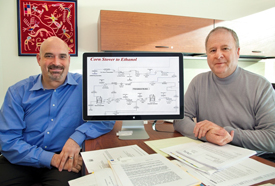How a Microbial Biorefinery Regulates Genes
Digesting lignin, a highly stable polymer that accounts for up to a third of biomass, is a limiting step to producing a variety of biofuels. Researchers at Brown have figured out the microscopic chemical switch that allows Streptomyces bacteria to get to work, breaking lignin down into its constituent parts.
PROVIDENCE, R.I. [Brown University] — Microorganisms that can break down plant biomass into the precursors of biodiesel or other commodity chemicals might one day be used to produce alternatives to petroleum. But the potential of this “biorefinery” technology is limited by the fact that most microorganisms cannot break down lignin, a highly stable polymer that makes up as much as a third of plant biomass.
Streptomyces bacteria are among few microorganisms known to degrade and consume lignin. Now a group of researchers at Brown University has unlocked the genetic and molecular mechanisms behind a key part of that process. The results are published in the journal Nucleic Acids Research. (more…)

